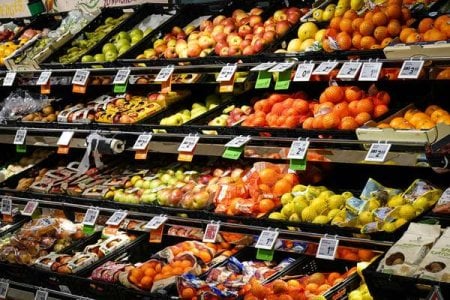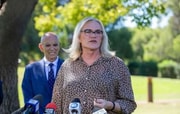Stop overpaying: Government reveals plans on crushing price gouging
By
Danielle F.
- Replies 43
Aussies, especially seniors, have been feeling the pinch of the cost of living crisis.
Prices of essential goods and items have continued to rise, leaving a dent in people's savings.
A bold declaration from the government came as a relief to many Australians who have been grappling with rising living costs and shrinking wallets.
Prime Minister Anthony Albanese took a firm stance against supermarket price-gouging.
The Prime Minister promised to introduce legislation that would make the practice illegal.
Price-gouging refers to the act of a business excessively raising prices beyond fair prices, especially during times of high demand or limited supply.
It's a practice that has left many consumers helpless.

'I was asked today what price gouging is,' the Prime Minister prefaced.
'It's when supermarkets are taking the p***.'
Days after calling the election, Prime Minister Albanese billed the reform as a cost-of-living measure.
'Labor will make price gouging by supermarkets illegal,' Mr Albanese stated in an interview.
'Because Australian families deserve a fair price at the checkout, and Australian farmers deserve a fair price for their goods.'
As Aussies navigate supermarket aisles, many raised their eyebrows at the sudden spike in prices for everyday essentials.
It's a frustration felt across the nation, but what exactly constitutes price-gouging, and how will the government's proposed legislation tackle this issue?
The European Union, United Kingdom, and parts of the United States have laws in place to protect consumers from such predatory pricing.
Yet, Australia's current legal framework lacked a clear definition of price-gouging.
The Australian Competition and Consumer Commission (ACCC) has the authority to investigate and act against anti-competitive practices.
However, there's no specific law that addresses price-gouging.
Last November, a class action lawsuit was launched against Coles and Woolworths supermarkets with claims of deceptive pricing practices.
The lawsuit alleges violations of Australian Consumer Law by making false or misleading representations about product pricing.
A previous Senate inquiry also suggested that Coles and Woolworths are setting unfair prices and abusing market power, negatively impacting consumers and suppliers.
The inquiry recommended amending the Competition and Consumer Act 2010 to make price gouging an offence. It also supported divestiture laws to break up supermarkets engaging in anti-competitive conduct.
The first step in this legislative journey will be to implement the ACCC's supermarket inquiry report recommendations, which called for greater transparency around pricing, promotions, and loyalty programs.
The government also aimed to establish a task force to advise on the introduction of an excessive pricing regime, which the ACCC would oversee.
The proposed reforms could give consumers fair prices and ensure that Australian farmers receive fair earnings for their produce.
Treasurer Jim Chalmers emphasised that the government's focus is on delivering better deals for families and farmers alike.
Meanwhile, Liberal leader Peter Dutton shared a different approach for a solution.
He suggested that under a Coalition government, supermarkets could be forced to sell stores if they maintain high prices.
The debate over how to regulate supermarket pricing has been contentious among Australians.
As we await further details on the proposed legislation, the fight against price-gouging goes beyond laws and regulations.
It's about creating a fairer marketplace where competition can thrive, and consumers can shop with confidence.

We would love to hear from you. Have you noticed price hikes on your grocery bills? Will the government's proposed legislation make a difference? Please share your thoughts and experiences in the comments below.
Prices of essential goods and items have continued to rise, leaving a dent in people's savings.
A bold declaration from the government came as a relief to many Australians who have been grappling with rising living costs and shrinking wallets.
Prime Minister Anthony Albanese took a firm stance against supermarket price-gouging.
The Prime Minister promised to introduce legislation that would make the practice illegal.
Price-gouging refers to the act of a business excessively raising prices beyond fair prices, especially during times of high demand or limited supply.
It's a practice that has left many consumers helpless.

Supermarkets like Coles and Woolworths have been accused of unfair pricing practices. Image Credit: Pexels/Magda Ehlers
'I was asked today what price gouging is,' the Prime Minister prefaced.
'It's when supermarkets are taking the p***.'
Days after calling the election, Prime Minister Albanese billed the reform as a cost-of-living measure.
'Labor will make price gouging by supermarkets illegal,' Mr Albanese stated in an interview.
'Because Australian families deserve a fair price at the checkout, and Australian farmers deserve a fair price for their goods.'
As Aussies navigate supermarket aisles, many raised their eyebrows at the sudden spike in prices for everyday essentials.
It's a frustration felt across the nation, but what exactly constitutes price-gouging, and how will the government's proposed legislation tackle this issue?
The European Union, United Kingdom, and parts of the United States have laws in place to protect consumers from such predatory pricing.
Yet, Australia's current legal framework lacked a clear definition of price-gouging.
The Australian Competition and Consumer Commission (ACCC) has the authority to investigate and act against anti-competitive practices.
However, there's no specific law that addresses price-gouging.
Last November, a class action lawsuit was launched against Coles and Woolworths supermarkets with claims of deceptive pricing practices.
The lawsuit alleges violations of Australian Consumer Law by making false or misleading representations about product pricing.
A previous Senate inquiry also suggested that Coles and Woolworths are setting unfair prices and abusing market power, negatively impacting consumers and suppliers.
The inquiry recommended amending the Competition and Consumer Act 2010 to make price gouging an offence. It also supported divestiture laws to break up supermarkets engaging in anti-competitive conduct.
The first step in this legislative journey will be to implement the ACCC's supermarket inquiry report recommendations, which called for greater transparency around pricing, promotions, and loyalty programs.
The government also aimed to establish a task force to advise on the introduction of an excessive pricing regime, which the ACCC would oversee.
The proposed reforms could give consumers fair prices and ensure that Australian farmers receive fair earnings for their produce.
Treasurer Jim Chalmers emphasised that the government's focus is on delivering better deals for families and farmers alike.
Meanwhile, Liberal leader Peter Dutton shared a different approach for a solution.
He suggested that under a Coalition government, supermarkets could be forced to sell stores if they maintain high prices.
The debate over how to regulate supermarket pricing has been contentious among Australians.
As we await further details on the proposed legislation, the fight against price-gouging goes beyond laws and regulations.
It's about creating a fairer marketplace where competition can thrive, and consumers can shop with confidence.
Key Takeaways
- Prime Minister Anthony Albanese accused supermarkets of price gouging and declared that he would make it illegal.
- Albanese promised to introduce reforms that would improve transparency about prices and promotions following ACCC recommendations.
- The ACCC previously took legal action against Woolworths and Coles for allegedly misleading consumers about discounts through their promotional campaigns.
- A class action was also launched against the supermarket duopoly for allegedly deceptive pricing.







